Copy-Paste: Superficiality on Human Rights Portals

Copy-Paste: Superficiality on Human Rights Portals
By: Arman Fazlić, Sanela Kapetanović, Matea Katić
The approach to human rights themes is generally superficial and lacks a comprehensive view of the whole picture. News portals with disclosed Legal Notices are more active than “anonymous” portals, which typically have no authored content and whose articles are mostly copied from other sites or based on press agency news/press releases. These are some of the findings after four weeks of monitoring six news portals (bhdijaspora.net, globalno.org, bh-vijesti.com, dnevnik.ba, novi.ba and infosrpska.ba) which, judging by the themes of published content, have a common target audience (citizens of BiH in the country and diaspora, and regional audiences).
The goal of the monitoring was to analyse trends and adherence to professional standards in reports, especially those related to human rights issues, focusing on content related to migrants and the LGBT population.
Legal Notices and Daily Number of Posts
Comparison of Legal Notices immediately revealed differences in the transparency and operations of analysed portals.
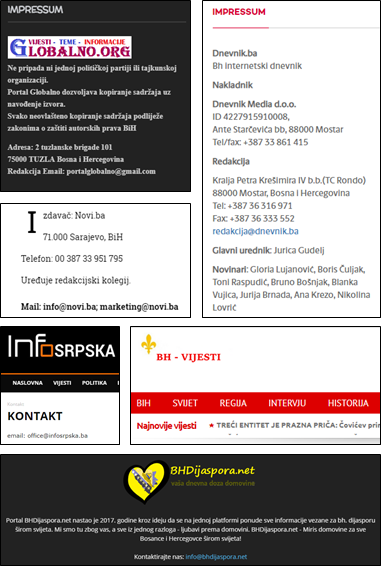
For example, the Legal notice of Globalno.org is visible immediately on the homepage and contains the address and e-mail contact information. The mailing address is authentic, which is why the Legal Notice can contribute to the readers’ confidence in the credibility of its content. However, the Legal Notice does not provide the names of editors/staff, so it can be said that this portal is not fully transparent to its audience.
The portal Novi.ba also does not present any staff names. Therefore, their Legal Notice is incomplete and can lead to reduced trust from the audience. However, it is commendable that Novi.ba provides, in addition to the e-mail address, its telephone number as an additional contacting option.
The only news portal from the sample with a complete and fully informative Legal Notice, stating that it is a full-fledged member of the Press and Online Media Council in BiH is Dnevnik.ba, while Bh-vijesti.com has no Legal Notice or any contacting option whatsoever.
News portals Bhdijaspora.net and Infosrpska.ba present their readers only with an e-mail address, and the way in which Infosrpska.ba presents itself to its audience is particularly interesting. The section “About us” offers an interesting explanation of the reason for hiding the identity of editors, journalists/authors and collaborators – as a way of protecting free and brave journalism. However, as will later become clear, the explanation proves to be the opposite of the true nature of the news portal in terms of its posts, as well as editorial policy and agenda.
Quantitative data collected during the first week of monitoring showed that news portals containing a Legal Notice publish much more content daily than those without one, or an incomplete Legal Notice. For example, portals Dnevnik.ba and Novi.ba published between 40 and 70, i.e. 40 and 60 articles every day from 29th April to 5th May, while Infosrpska.ba and Bhdijaspora.net published 100, i.e. 50, articles in the whole period.
Editorial Policy: Copy-Paste Journalism and clickbait content
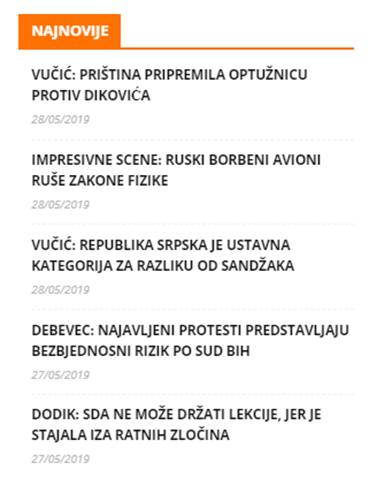
Six portals from the sample generally paid little attention to investigating themes covered in their posts. The dominant form is news, mostly previously published on other portals and copied, or taken from press agencies, in most cases without citing sources and often packaged as clickbait. Authored content was only recorded on Dnevnik.ba and Novi.ba, whether in the form of news or comments. The themes covered by sample portals are generally diverse and it is difficult to identify a clear editorial agenda given that the portals are focused on collecting clicks and profit. However, the portal Infosrpska stands out in terms of editorial policy.
Specifically, analysis of the content of Infosrpska demonstrated the prevalence of affirmative articles on the governing structure in the Republika Srpska entity, as well as on officials and politics of the Republic of Serbia and the Russian Federation.
The majority of texts was selectively copied from other portals, and ordinary press releases are placed in the context of dominant politics by using biased headlines. For instance, out of 10 posts on this portal published on 13th May, as many as five were dedicated to the views of leading persons of the governing party in RS. Content mentioning the opposition in RS is rare and, if published at all, is typically critical and depicts the opposition negatively.
One of such articles, published on 14th May and entitled “Sramni napad Mladena Bosića na Republiku Srpsku” (Mladen Bosić’s Shameful Attack on Republika Srpska), could be classified as a comment although it is unsigned and failed to contact the “other side”. This is just one example of biased and propagandistic reporting which is not lacking on this news portal.
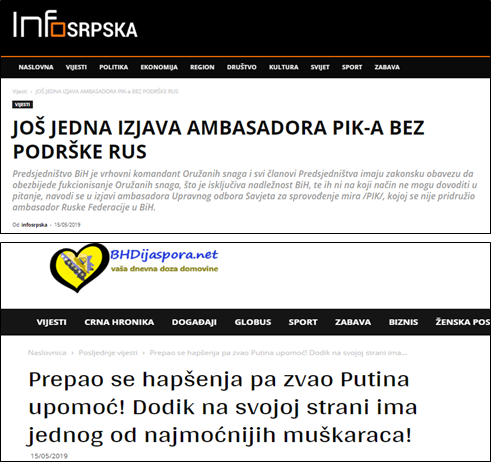
Not a single authored or researched article, analysis or comment appeared on Infosrpska.ba during the analysed period, which sheds a satirical light on the meaningless idea of protecting the identity of its journalists and editors explained in the About us section, so that anonymity would protect them in brave journalistic uncovering of truth.
Contents published on portals Infosrpska.ba and Bhdijaspora.net that were based on the press release by the Russian Embassy in BiH in reference to the statement by the Peace Implementation Council were particularly interesting. Namely, the unknown editorial staff of both portals used creative headlines to appropriately frame information from the press release. For Infosrpska, the essence of the press release was that the Peace Implementation Council was (once again) deprived of Russian support, whereas Bhdijaspora, as per usual, packaged its article as clickbait.
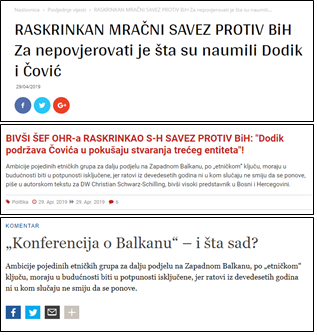
In terms of clickbait headlines, a large number of cases was identified on Bhdijaspora. The unknown editorial staff of the portal Bhdijaspora.net published a series of unclear and intriguing headlines, such as the article referring to the comment of former High Representative in BiH, Christian Schwarz-Schilling, published by Deutsche Welle on 29th April 2019, entitled “’Konferencija o Balkanu’ – i šta sad?” (“Balkans Conference” – What Now?), and the article on the statement made by the Polish Ambassador to the United Nations on 8th May. A simple Google search easily revealed that the headlines were not designed by the editors of Bhdijaspora, but that this content is also recycled, in both cases from the news portal Slobodna-bosna.ba.
When it comes to clickbait headlines, Bhdijaspora.net is in the forefront relative to other news portals from the sample. We recorded two more cases from the crime news section: an article published by the portal on 2nd May 2019, about a murder that took place in 2015, which was covered by the media at the time. Although the text states that the case is from 2015, the headline suggests that it is a current case. The second example is an article about a revised verdict for a crime committed in 2016, with a headline that suggests a brutal murder just took place.
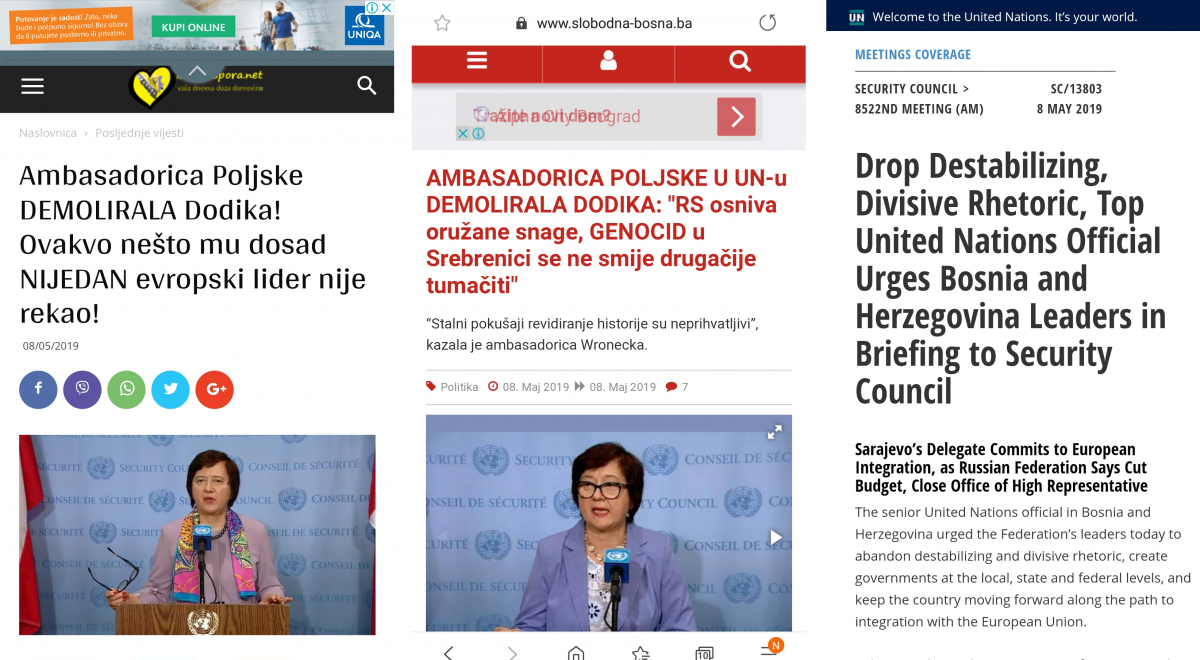
Human Rights in Published Content
Texts that discuss vulnerable categories in the society are rare in posts of all portals from the sample and are typically created on a copy-paste basis. The approach to human rights issues is generally superficial, especially in terms of content related to migrants and the LGBT population. The content that does deal with these subjects lacks problem-specific analyses of the position of vulnerable groups in society, as well as analyses of systematic and legislative frameworks in the context of the treatment of migrants or members of the LGBT population.
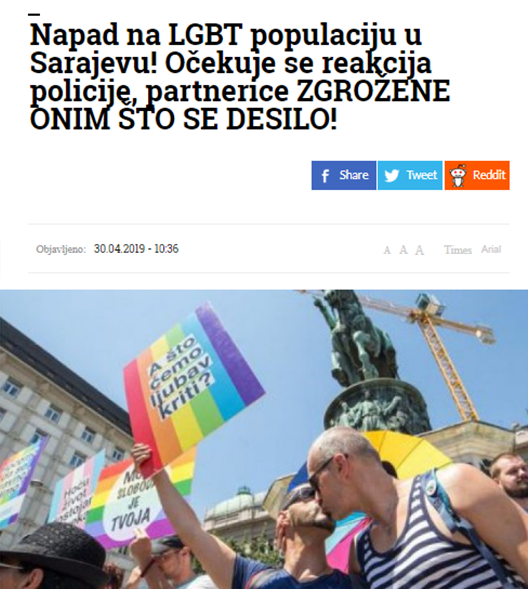
Furthermore, articles discussing human rights are given a clickbait purpose. One such article was published on Novi.ba on 30th April, and its headline suggests that another attack on the LGBT population took place in Sarajevo. After reading the article it becomes clear that its subject is actually the reaction of the Organisation Committee of the BiH Pride Parade to the attack that happened a few days earlier. Apart from that, the readers are not informed about the case from the MOI, while the photograph/illustration used in the article, which is not captioned and was really taken during the Pride Parade in Belgrade in 2017, contributes to the additional stereotyping of LGBT persons.
There were slightly more news articles about migrants than about the LGBT population. They mostly discussed the negative context of the impact of migration on the BiH society. Novi.ba, for instance, shared a video recording from the Facebook page Krajina.ba, which shows a fight between several persons, but it is unclear who is fighting, or what are the motives and consequences.
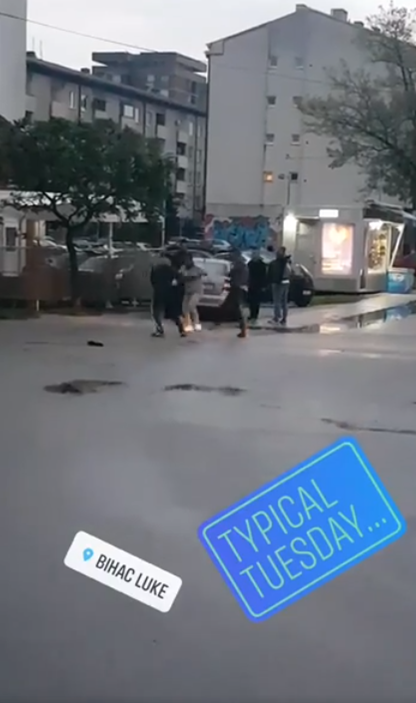
Along with the observation and suggestion of the unnamed author that the video demonstrates the danger posed by migrants, which causes concern among citizens, the article also states that this is not the first recorded case of violence. The article makes it clear that neither the MOI of the Una-Sana Canton nor any other official source was contacted to gain a complete and truthful piece of information.
The same news from the portal Avaz.ba was also shared by Dnevnik.ba, which offered no additional information, official statements from the USC MOI or official data on the number of “unusual scenes” in Bihać which were hinted at in the article.
Among analysed posts on the portal Dnevnik.ba there was a case of fake news published on 4th May 2019, about an alleged physical assault of migrants on a juvenile in Sarajevo. Additional checks revealed that the editorial staff of Dnevnik.ba shared a text from Klix.ba published on the same day.
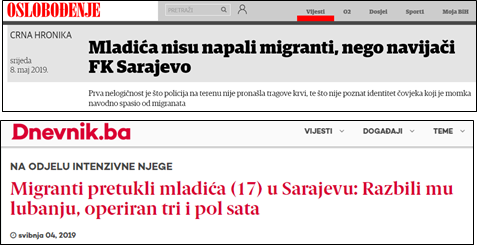
That the news was completely fake became clear a few days later, on 8th May, after the completion of the police investigation. Some media outlets published details of the investigation which ascertained that the incident was a confrontation of supports of local football clubs, Željezničar and Sarajevo. It is clear from the media “race” to come up with the most sensationalist headlines that the media completely bought the unsubstantiated accounts and actively participated in spreading xenophobia and hatred for migrants that was spurred by the reports on social media. From the beginning, the story was characterised by several incongruities which the media did not pay any mind, as stated in an article by the newspaper Oslobođenje from 8th May: "The first inconsistency was that the police in the field found no traces of blood and that the identity of the man who supposedly saved the young man from migrants was unknown." The majority of news portals that shared the news about the alleged migrant attack did not publish a correction or remove the article from their websites, which is also the case for Dnevnik.ba. Needless to say, not a single news portal offered an apology for spreading fake news and additionally worsening the already bad situation of refugees and migrants in BiH society.
This type of content is unprofessional and unethical because it shares information in a sensationalist manner, without taking into account the entire issue, intending to attract readers. It contains no information from centres for foreigners’ accommodation about the situation and living conditions, or statements from volunteers or information from relevant sources about the countries of origin of these persons or their formal and legal status. Unethical reporting contributes to the spread of xenophobia and racism, and such content is directly reflected on the conditions in which these persons, among which there are women and children, live.
Clicks and Profit
Four weeks of analysing the content of six news portal between 29th April and 27th May 2019 identified one case of fake news and numerous cases of unverified and unprofessional contents, whose motives are most often clicks and profit, but sometimes also political. These contents contribute to negative trends in society, such as violation of human rights and freedoms, spreading hatred or causing a general sensation of insecurity. At the same time, disinformation harms professional journalism, the quality of public information and citizens’ trust in the media and public discourse. The fight against the spread of disinformation, especially online, is a challenge and requires all segments of the society to keep a watchful eye, including the non-governmental sector, the media community, as well as decision-makers and public policy, particularly in the area of education and media literacy of the population.
The analysis was carried out after the training for journalists and journalism students “Medijska pismenost i verifikacija informacija - od klika do ispravke” (Media Literacy and Verification of Information – From Click to Correction) which was held on 23rd April 2019. Arman Fazlić was one of the trainers and mentors to the group of journalists that carried out the analysis. The Project was implemented by Mediacentar Sarajevo for SEENPM and TOL.
___
Želite sedmični pregled vijesti, analiza, komentara i edukacija za novinare u Inboxu Vašeg e-maila? Pretplatite se na naš besplatni E-bilten ovdje.




